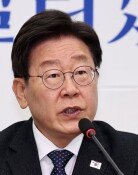Nobel Chemistry Prize winner William Moerner visits Seoul
Nobel Chemistry Prize winner William Moerner visits Seoul
Posted May. 20, 2016 07:54,
Updated May. 20, 2016 07:59
“Less than 5 percent of the applicants to Stanford get to enjoy the honor of admission. I was able to get the Nobel price because I could work with excellent talents.”
This reporter interviewed Professor William Moerner (63) of Stanford University, who visited Korea for the first time to give a keynote speech at the "2016 International Academic Symposium on Biochemistry and Molecular Biology," which was held at KOEX in the southern district of Seoul. In 2014, Professor Moerner got the Nobel Prize in Chemistry, for the development of super-resolved fluorescence microscopy, which is being used in most college labs now. The fluorescence allows observers to detect a single molecule smaller than the wavelength of light.
“I am working on converging the use of fluorescence microscopy with other various fields including medicine and engineering,” said the professor. “I expect to make contributions to developing new medicines or special materials by better understanding about the tiny world measuring two or three nm (1nm = 1 millionth of a mm).
Professor Moerner is well known for his dedication to his students. In fact, he emailed each and every of his students to express gratitude after he won the Nobel Prize. Even during his speech at the award ceremony, the Nobel Chemistry Prize laureate showed the pictures of the 20 or so students who participated in his research to share the credit with each of them.
This time, the professor visited Korea at the invitation of his Korea student, Kim So-yeon, a senior researcher at the Korea Institute of Science and Technology. In fact, Professor Moerner was accompanied by Kim in his interview. Kim earned her doctorate after working in Mr. Moerner’s laboratory for eight years since 2001. “He wears his tool belt and fixes the lab with his hands. He is like MacGyver,” said Kim. "My peers consider him more as a friend than as a teacher."
Professor Moerner stressed the importance of fostering a free environment for research for Korea to produce excellent research findings that could earn it a Nobel Prize someday. “These days, many young students lose their passion for research after experiencing a single failure," said the professor. "For our promising young scientists that will lead the future, we need a system in place focused on the process than on the results, and we need to give them more time.”
권예슬동아사이언스기자 yskwon@donga.com







